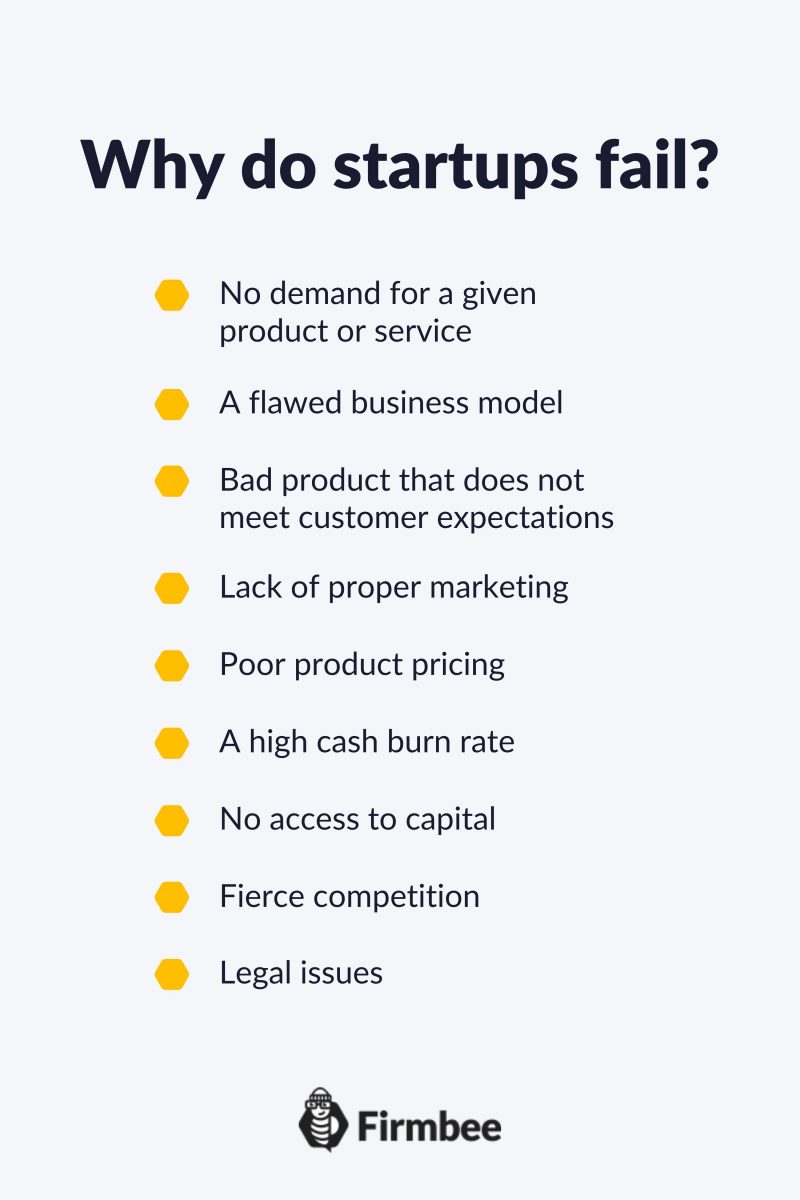You think that you’ve come up with a revolutionary idea that will help you launch a profitable startup and conquer global markets. Then comes the sobering thought. Most startup businesses end disappointingly, even though they are based on brilliant concepts. Why do startups fail? Read our article to find out more.
Why do startups fail? – table of contents:
Why do startups fail?
Before we move on to discuss specific startup ideas that usually fail, it is worth analyzing the reasons why even seemingly good business concepts turn out to be unsuccessful. Several key points should be highlighted here.
Young businesses fail primarily due to a lack of demand for a given product or service. It often turns out that someone else has already developed a similar solution, and, apparently, the market has become saturated.
Another common cause of startup failures is the lack of a business model. Without it, you won’t be able to acquire and retain customers. Many startup founders have experienced this painfully.
The third issue is simply developing a bad product that does not meet customer expectations. A good business idea can also be ruined by a lack of proper marketing. If your business does not stand out from the crowd, it won’t attract attention and customers.
Additionally, startups often fail because of poor product pricing. As a result, it is difficult for them to reach the break-even point at which they could become profitable.
Other reasons why startups fail are as follows:
- a high burn rate
- a lack of funding
- fierce competition
- legal issues
Below, we have made a checklist of business ideas that usually turn out to be flops.
6 startup ideas you should avoid
Search engines
Once in a while, some budding entrepreneurs who are tempted by the search engine market come along.They are not put off by the fact that it’s an extremely tough market dominated by such giants as Google and Bing. However, search engine startups hope to enter it with a bang and revolutionize it. Many have already tried and always failed, for example, Cuil or Wolfram Alpha.
Alternatives to emails
There has been a huge number of startups that wanted to replace email with other communication solutions. They have all failed miserably. Even various ideas for improving the email inbox have not been successful. Nevertheless, startups based on this concept continue to appear and disappear.
Local news services
It turns out that a tempting startup idea might be also creating a network of local news services. The problem is that building such communities isn’t usually lucrative. The media market is very difficult as the competition is fierce, and profitability hard to achieve. Such niche businesses don’t stand a chance to become successful.
Micropayments
Startup founders are keen on the idea of micropayments, especially in the context of paying for content online. The offered solutions are often similar. For example, the recipient wants to read a paid article on a portal, support a blogger for an interesting post, etc., so they easily make a payment for that specific purpose. It sounds interesting in theory, but in practice, investing in micropayments has always turned out to be a business flop so far.

Businesses aimed at kids
Companies aimed at young children seem like a good idea, but in practice it’s quite the opposite. Many startups try to offer products and services that are targeted at children, but these are actually niche audiences. As a result, such businesses are simply not successful. The biggest problem occurs when a product is aimed at a child of a specific age who is about to grow up, and yet fewer and fewer children are born.
Automobile companies
Many entrepreneurs have an appetite for revolutionizing the automotive industry. Ideas related to cars seem ideal for startups to many people, and Tesla can be pointed out as an example of success. However, it is important to note that although the company has come across some bumps along the way, it is starting to benefit from the growing trend of electromobility.
For many years, however, its sales were low and still are not the best. Besides, it should be noted that almost all major car companies are now switching to electric engines, so the competition has become fierce. In any case, most automotive business ideas that came after Tesla have failed.
Music companies
It’s also hard to talk about major online music ventures that turned out to be successful. They simply don’t exist. The most well-known startup of this type is Spotify, but after many years of existence in the market, even this world-famous brand is making a loss. For example, Spotify ended 2021 with $44.6 million in debt.
Why do startups fail? – summary
To conclude, you need to be careful with startup ideas. A thorough analysis of the market and actual consumer needs is always necessary. Some concepts often fail as they are poorly implemented, others simply do not work on the market, and even the best business plan won’t change that.
If you like our content, join our busy bees community on Facebook, Twitter, LinkedIn, Instagram, YouTube, Pinterest.
Author: Andy Nichols
A problem solver with 5 different degrees and endless reserves of motivation. This makes him a perfect Business Owner & Manager. When searching for employees and partners, openness and curiosity of the world are qualities he values the most.
Launch your startup:
- What is a startup?
- Pros and cons of creating a startup
- 8 best industries for startups
- Top 5 skills every highly successful startup founder needs
- How to create a startup? 7 simple and easy steps
- 6 essential startup development stages
- How to create a startup growth strategy?
- General startup statistics you need to know
- Startup vs. corporate job. Which is right for you?
- 5 incredible companies that started in a garage
- How to find a business idea?
- How to check if your startup idea already exists?
- How to name a startup? Useful tips and strategies
- How to gain business knowledge quickly? 5 best practices
- Why do startups fail? 6 startup ideas you should avoid
- 5 weird business ideas that made millions
- Top 6 most profitable small businesses
- 7 questions to determine if your business idea is worth pursuing
- What is a buyer persona? 5 benefits of creating a buyer persona
- How to validate your business idea? 3 easy steps
- Should you follow your passion? The importance of passion in business
- What is market reseach and why is it important?
- Using social media in business
- What to do when you have too many business ideas?
- How to write a good problem statement for your startup?
- How to test your business idea for real?
- How to create a prototype for a product?
- How to build an MVP?
- How to use surveys for testing your business idea?
- 10 useful tools to validate your business idea
- What is a business plan? 4 types of business plans
- What should be included in a business plan?
- What should a product description include?
- Competitor analysis
- Marketing strategy
- Traditional business plan vs. lean startup plan
- Implementation plan. What is it and how to create it?
- Everything you need to know about patents
- Financial management for startups
- What permits and licenses does my startup need?
- What is the average startup founder salary?
- 4 startup taxes you need to pay
- Which legal structure is best for your business?
- Startup costs. How much money will you need?
- Protection of intellectual property in a startup
- Family funding vs. self-funding
- What is a shareholders’ agreement?
- What should a financial section of a business plan include?



















